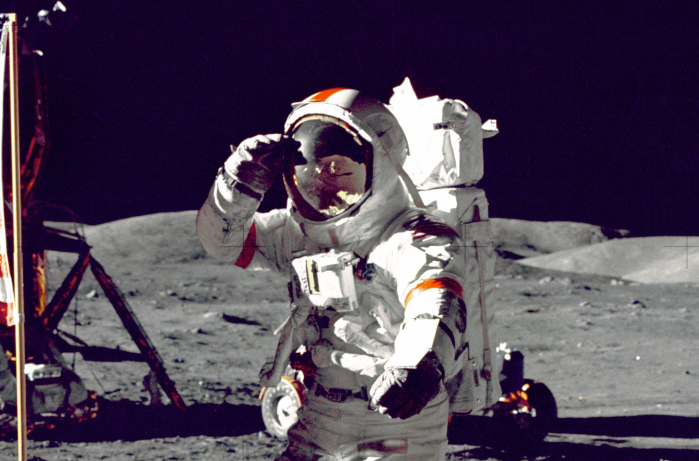Julius Evola’s concept from Cavalcare la tigre intimates that modernity is an enormous, unslowable monster atop which dissidents can only perch until it stops running. It holds there is no stopping this thing, at least, not in the foreseeable future, and not with the present arsenal we have power over. In Evola’s terms, from Chapter 6 of Cavalcare, we ultimately must await a saviour. But it does not mean we should not attempt to dig in our spurs, or to grasp at reins.
I am reminded of what Spengler said of Nietzsche:
It was [Nietzsche’s] fate to come into the world after the Rococo period, and to stand amid the totally cultureless 1860’s and 1870’s. Consider the streets and houses he had to live in, the clothing fashions, furniture, and social mores he had to observe. Consider the way people moved about in social circles in his day, the way they thought, wrote and felt.
Spengler continues that in reaction to this culture, Nietzsche, who longed for that of the previous century, had no other recourse than to “protest passionately against everything contemporary.” He did this, but ultimately, he turned his back on society, and even preempted Evola’s musings; that while ferocious Action may present some superficial victories, or while we can become “active nihilists,” it is not through us that change will come. For Nietzsche it was the noble Over-human, for Evola it was the Aristocrat of the soul.

Of course, this is not who we are. We do not await things, we create them. We are not temporal, run by whimsy — the turning pages of the calendar — nor are we seasonal, or migratory, but we are above that. We do not dwell on the low, the base, the harmful, but instead, as Muslims have learnt very well to do, we take ideas from the negative, and turn them into glorious lessons for ourselves. Our philosophy comes to us in a time when our culture is at an all time low. The mores of Nietzsche’s time seem to us as positively luminous when compared to the empty-headed rat-sports and vibration-led sweat-parties of today. Our music is hollow, “our” Art, when it purports to have any meaning at all, is deleterious and has degenerated further than after the Depression, and our People are, more than they have ever been, corvée and laboři — robots — the Last Man — deterritorialised — demoralised — deracinated — common-currency humans.
It is often said that it is better to die on one’s feet than to live on one’s knees. It is not useful to think in these terms, and, again, we are a civilisation that once shunned any harmful questions, for they do nothing for us. For we have reached such a time in the progress of humanity that the denial of life equals the affirmation of it, but by denying modern reality in itself, we do not explicitly deny self-hatred, self-abuse, degeneration, the decadence of our spirits and our ultimate geno/suicide. Nihilism must be understood, as I argue it is, with careful reading, as self-destructive. That is, as it brought down the European to a spiritless, metaphysically impoverished being, it is a parasitic idea, and also swallows itself. In my summation, it shall do so before it destroys us.
The popular understanding of Ride the Tiger, therefore, must be altered. While the above is true, Nietzsche and Evola both also advocated for vitalism — for extreme engagement. Whether this means unfettered and insulting critique of anything unworthy of us, or an exaltation and uplifting of anything that is good, or a seeking of exhilarating and meaningful experiences, it means we cannot sit back and await what comes next.

As John Chapman wrote for The American Sun, PissEarth, 2025 is the logical outcome of this mode of being: liberalism can only culminate with the end of liberalism or the ultimate liberation of the individual. The latter is the encouragement, on moral grounds, of everything base: it is globalisation, commoditisation, multiculturalism, the corporate negation of racial differences, &c. We cannot resign ourselves to swimming the burning river — that it may be our the future does not mean it is our destiny.
But we deny ourselves oblivion not for some clinging reason given to us by biological function, nor do we need appeal to a particular variety of philosophical justification. We do this because we should, because by thought we experience the world as being, and by being we continue to think. Any discussion on worldly terms, of course useful to others, is secondary when this comes up amongst ourselves.
So find — or choose, for the brain is malleable, and thought is active — an interest; the right-hand path: painting, sculpture, architecture, diet, fitness, craftsmanship, teaching, gardening, farming, ethics, philosophy, environmentalism, urban planning, or the left-hand path: videogames, local political groups, energy drinks, photography, modelling, metal music. Regardless, find something and engage with it on your level: force your Noble Identity upon it.
We cannot in any seriousness, or in name, even, organise or advocate squadrismo, the ethic of violence that once enlivened the paramilitaristic Ultras of Italy. But, as above, and as Clifford Geertz recognised, identity, or ideology, is “the very texture of thought.” But, as Mark Dyal, in the illuminating and heartful book on the subject, Hated and Proud: Ultras Contra Modernity, intimates, knowledge has reality-producing power, and writes how “Massimiliano” of the Ultras wished to “live according to values — bravery, strength in the face of any opposition, brotherhood,” valour, discipline, and other martial attributes, and of course this is also our goal. And we must make it so.

The Italian word mentalità, meaning “mentality,” encompasses almost a sense-able cultural worldview, an us/them distinction and connectedness, the monumental model of history, and a mode of being which aims higher, or at least, aims, in elation, above modernity. Amongst the Ultras, it can be something as simple as a refusal to eat peanut butter, but as profound as “unfailing steadfastness,” or the seeking of electric, violent encounters. Mr. Dyal defines it a motivating mode of thinking which provides “a particular moral-ethical orientation to behaviour.” We have a different mentality.
Beneath the dais of this mentality are vast and cohesive supporting structures, which are built of monumental history, heroic stories, and concepts of brotherhood and territorialisation. But amongst, or even suffusing or below these, lies Myth: a public narrative. Myth, as Dyal agnises, constructs distinction between groups, builds morality, justifies social structure, but also “operates as a self-standing phenomenon.”
(If this speaks to you, I highly recommend Mr. Dyal’s book on the Ultras, which, along with being an intriguing and passionate social and historical work, is an intriguing philosophical and political treatise on our type’s hostilities towards modernity. The Ultras are the Italian football non-bourgeois warriors who sought “to restore communal, spiritual, and ritual dimensions to modern life.” I am writing a review article.)
In short, we must prevail on this ride because we can distinguish type and see differences. We must succeed because we are exclusive and recognise local particularity. We must be victorious because we are straightforward, conscious and inflexible. But most of all, as Nietzsche recognised, we must prevail because our mentality is a positive one: we are prideful.
I got what you mean, thanks for posting. Woh I am happy
to find this website through google.
LikeLiked by 1 person
This is a difficult subject indeed. I have been contemplating the notion of Riding the Tiger for some time. It bears a slight resemblance to what Jünger laid out in The Forest Path and Eumeswil.
If I am not mistaken in my reading here, when you say “Of course, this is not who we are. We do not await things, we create them.” you are expressing reservations to this idea of simply waiting out modernity. If so, that would be my thought on the matter as well.
The problem with seeing modernity as something merely self-destructive is that the ideas are akin to parasites and the carriers are people, in this case European people, and so it will only die out when its carriers die out or develop an immunity to it.
I do think there is a potential to develop an organized form of praxis rather than random acts of rebellion, and one based upon constructive values. This is what I have been trying to work on, in any case.
LikeLiked by 1 person
I have only read Jünger’s Storm, but having found this quote I will certainly read more:
“in a theater blaze it takes one clear head, a single brave heart, to check the panic of a thousand others who succumb to an animalistic fear and threaten to crush each other. In speaking of the individual here, we mean the human being, but without the overtones that have accrued to the word over the past two centuries. We mean the free human being, as God created him. This person is not an exception, he represents no elite. Far more, he is concealed in each of us, and differences only arise from the varying degrees that individuals are able to effectuate the freedom that has been bestowed on them. In this he needs help – the help of thinkers, knowers, friends, lovers.”
You are correct that I am attempting to enact change — by which I mean that we presently cannot ignore modernity, nor simply allow it to run its course. I am not sure of the relationship between the European and modernity as a unit, whether it is merely parasitic or terminally cancerous, but either way it must be removed to the best of our ability, or, as you say, we must immunise ourselves to it, which is perhaps the only use of those such as us.
LikeLiked by 1 person
I wrote my latest post with you in mind, partly to clarify some of the things I said in my response to your comment on by blog:
https://uncoveringeurope.wordpress.com/2019/04/18/the-quarrel-of-the-ancients-and-moderns/
LikeLiked by 1 person
I will read this now.
LikeLike